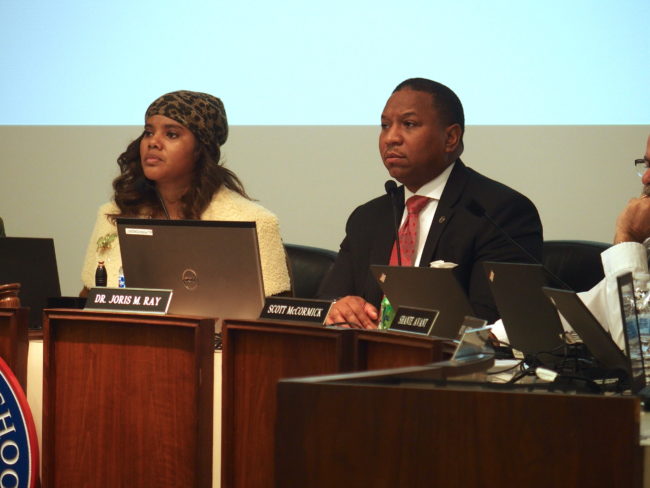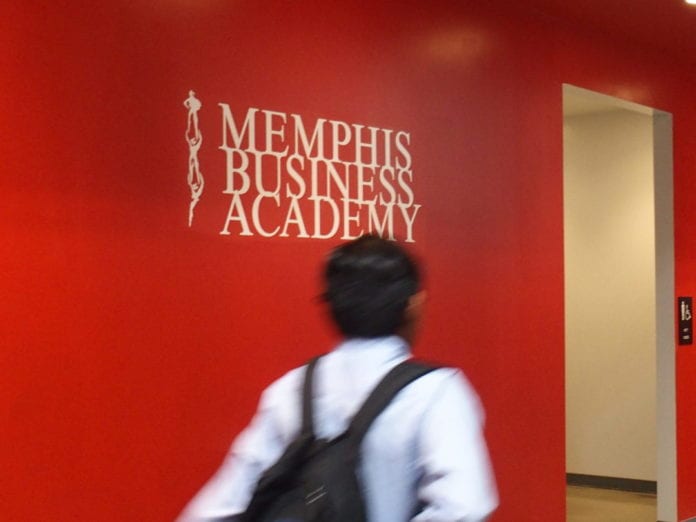Three Memphis charter schools will need to reduce their enrollment by about 250 students next school year following a Shelby County Schools board vote Tuesday.
The downsizing by Memphis Business Academy and Gestalt Community Schools is three times less than what district staff recommended last month after school board members made some exceptions to its policy because of favorable student test scores.
The schools had enrolled more students than their contracts with the district allowed. To comply with their agreements with the district, the charter schools could accept fewer students in their incoming class next year or, possibly, un-enroll some students. Shelby County Schools will work with charter school leaders to determine how to reduce enrollment.
In the case of a third school, Memphis Business Academy Elementary Hickory Hill, students in second through fourth grades will need to find a new school next year.
Board chairwoman Miska Clay Bibbs said the votes showed that the board is not trying to deny all charter school expansion even though the board recently called for a moratorium on the privately managed, publicly funded schools and is implementing a stricter policy to oversee them.

“The policy is here. So, it’s time for people to follow what it says,” she said after the votes Tuesday evening. “But at the same time, as a board, we do have the opportunity to look at each case differently.”
Board members say the decision is part of a larger effort by Tennessee’s largest district to maintain high standards for its charter schools and slow their growth. Shelby County Schools has 57 charter schools managed by nonprofit organizations, by far the most in the state. Students at charter schools make up about 15% of the district’s enrollment and account for most of the modest growth the district has seen in recent years.
School board members often lament how millions of dollars leave district coffers when more students enroll in charter schools. The new school board policy approved in July, which was formed during two years of negotiations with charter leaders, was in part meant to prevent “unfettered access to charter growth,” said board member Kevin Woods.
“If you are going to grow, it’s going to be based on performance,” he said during discussions Tuesday.
This summer, the district identified 13 charter schools that already enroll or plan to enroll significantly more students than what they anticipated in their contracts. State guidelines allow districts to determine how charter schools are allowed to make substantial changes in contract areas such as enrollment.
The criteria used to determine how contracts are amended are part of the new board policy. For example, if a school is part of a charter network, all the schools in the network need to be in good standing on the district’s report card, which monitors metrics such as test scores, suspension rates, and financial health.
Five of the 13 charter schools met that criteria. Eight did not because of a low score at the school or another school in their network.
In the end, the board based its decisions on individual school scores, rather than on scores across the charter networks.
Below are the schools that were allowed to expand beyond the original scope of their contracts (an asterisk shows which schools were initially recommended for denial):
- KIPP Memphis Collegiate High School, requesting 95 more students*
- Memphis Business Academy High, 155 more students*
- Memphis Business Academy Elementary, 142 more students*
- Power Center Academy Middle School Hickory Hill, 62 more students*
- Power Center Academy High School Hickory Hill, 210 more students*
- Crosstown High School, requesting 100 more students
- Freedom Preparatory Elementary School, 180 more students
- Memphis Grizzlies Preparatory Charter School, 140 more students and add fifth-grade students to its middle school
- Memphis Rise Academy, 101 more students and officially change its location to Raleigh, where the school has operated since 2014
- Vision Preparatory Charter School, 108 more students
Here are the schools the board voted not to expand beyond their contracted enrollment:
- Memphis Business Academy Hickory Hill Elementary, remove current second through fourth grade, about 60 students
- Memphis STEM Academy, reduce by 63 students
- Power Center Academy Elementary School Hickory Hill, reduce by 135 students
The charter schools could appeal to the state. Anthony Anderson, the CEO of Memphis Business Academy, said he will not appeal but instead will submit an amended petition to the district next month. Yetta Lewis, the CEO of Gestalt Community Schools, said before the vote in an email to staff that her network would appeal, but Lewis was not immediately available to confirm.

Lewis also said in the email that she had asked district leaders in 2015, before the new rules were implemented, about how to address over-enrollment and got little response.
“They just provided a process for us to report our enrollment. While we have asked about how to address these issues, there was never a policy or a way to petition or submit an amendment,” she said.
Brad Leon, the district’s chief of strategy and performance management, acknowledged the process before the policy was unclear. He said the district focused on the total number of students across all charter schools and did not take action because enrollment as a whole never exceeded what the district budgeted for.
Superintendent Joris Ray said his recommendation to deny expansion for the original eight schools was a “tough decision” but a needed correction from past practices.
“We’re trying to get it right now,” he told board members Tuesday. “I always err on the side of what’s in the contract and policy.”
Board member Stephanie Love said since the district had not been checking individual school enrollment before now, they should not be penalized.
“I don’t think we should punish the charter schools for doing something that the charter school office should have saw and corrected,” she said.
The charter schools have 10 days to appeal the decision to the state board. The state board would then be expected to vote on the appeals within 60 days.
The post Three Memphis charters forced to reduce enrollment by 250 students, most spared because of test scores appeared first on Chalkbeat.



